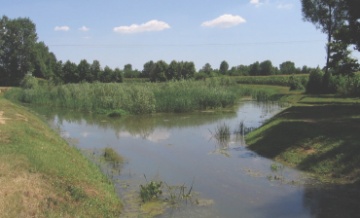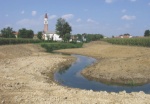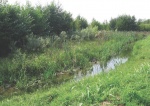Case study:Scolo Desolino restoration project: Difference between revisions
No edit summary |
No edit summary |
||
| (3 intermediate revisions by the same user not shown) | |||
| Line 64: | Line 64: | ||
}} | }} | ||
{{Measures | {{Measures | ||
|Floodplain / River corridor=Floodplain reconnection, Floodplain creation, Buffer strips, | |Floodplain / River corridor=Floodplain reconnection, Floodplain creation, Buffer strips, | ||
|Planform / Channel pattern=Channel naturalisation, | |Planform / Channel pattern=Channel naturalisation, Channel widening, Meandering channel, | ||
|Other technical measure=Creation of in-stream and out-stream wetland | |Other technical measure=Creation of in-stream and out-stream wetland | ||
|Management interventions=Adoption of new practices for | |Management interventions=Adoption of new practices for aquatic vegetation management | ||
|Social measures=Involvement of farmers in buffer strips plantation | |Social measures=Involvement of farmers in buffer strips plantation | ||
}} | }} | ||
Latest revision as of 16:43, 2 January 2019
Project overview
| Status | Complete |
|---|---|
| Project web site | |
| Themes | Flood risk management, Habitat and biodiversity, Land use management - agriculture, Land use management - forestry, Monitoring, Water quality |
| Country | Italy |
| Main contact forename | Paolo |
| Main contact surname | Cornelio |
| Main contact user ID | |
| Contact organisation | Consorzio di Bonifica Acque Risorgive |
| Contact organisation web site | http://http://www.acquerisorgive.it/ |
| Partner organisations | |
| Parent multi-site project | |
| This is a parent project encompassing the following projects |
No |
Project summary
The main objectives of this project concerned the reduction of flood risk and of nutrients supply to Venice Lagoon to avoid eutrophication; in the same time an increase of biodiversity was expected. These different objectives have been reached by a number of restoration actions: river section enlargement, increase of sinuosity by the creation of new meanders,in-stream and out-stream wetlands and adoption of new practices in river management to permit a complete or partial preservation of aquatic vegetation; the creation of 4220 m.of new woody riparian buffer was mainly done for nutrient removal.
Monitoring surveys and results
Lessons learnt
Image gallery
|
Catchment and subcatchmentSelect a catchment/subcatchment
Catchment
Subcatchment
Other case studies in this subcatchment: Pagana canal restoration project, Rio San Martino and Piovega di Scandolara restoration project, Rio Sant'Ambrogio restoration project, Salzano wetland and Marzenego river restoration project, Zero river restoration project
Site
Project background
Cost for project phases
Reasons for river restoration
Measures
MonitoringHydromorphological quality elements
Biological quality elements
Physico-chemical quality elements
Any other monitoring, e.g. social, economic
Monitoring documents
Additional documents and videos
Additional links and references
Supplementary InformationEdit Supplementary Information
| ||||||||||||||||||||||||||||||||||||||||||||||||||||||||||||||||||||||||||||||||||||||||||||||||||||||||||||||||||||||||||||||||||||||||||||||||||||||||||||||||||||||||||||||||||||||||||||||||||



